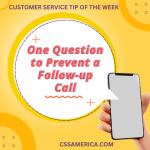 In the world of customer service, to begin finding a resolution, sometimes we have to initiate conversation. To keep things moving forward, oftentimes we have to proactively engage in discussion. To have effective dialogue, we need to avoid those long periods of dead silence.
In the world of customer service, to begin finding a resolution, sometimes we have to initiate conversation. To keep things moving forward, oftentimes we have to proactively engage in discussion. To have effective dialogue, we need to avoid those long periods of dead silence.
But don’t let those truths of the need to speak and converse keep you from seeing an even bigger truth. In customer service, silence truly is golden.
Blessed is the man who, having nothing to say, abstains from giving us word evidence of the fact – George Eliot
We’ve often said that empathy is the greatest quality for someone in customer service, because it requires us to understand others before we can serve others. And to best understand, we need to be great listeners.
Silence is not always a Sign of Wisdom, but Babbling is ever a Mark of Folly – Benjamin Franklin
Sometimes we get into a flow of things in conversation such that what goes in our mind pops out of our mouth without necessarily the intent in saying what we really need to say in the way that we really need to say it. Listening and having an intent to how we respond shows greater wisdom and respect for the other person than speaking without any filter whatsoever.
Speaking comes by nature; silence, by understanding – A German Saying
Many people in customer service are naturally conversational, but by sharing every thought, we could be missing that which is in the other person’s mind. We might not be seeking to find a deeper understanding of what is going on with the other person. We may be a great conversationalist, but we can prove it by letting the other person talk just as well as we can prove it by hearing ourselves speak.
As you embark on 2020 and try to get even better than you already are in working with and serving others, concentrate on listening just a little bit better…speaking just a little bit less.
Remember why Silence is Golden.
Signup for FREE Tips! Contact Us More Resources for You Visit Our Home Page














 There is joy absolutely everywhere,
There is joy absolutely everywhere, Everybody sing with me:
Everybody sing with me: 






